|
Somerset Beekeepers’ Association (SBKA) is calling on the public to help fight a major threat to honey bees and other pollinators - Asian hornets.
To date around 51 nests have been discovered in the UK so far this year, more than three times the number found in the last six years combined. Local beekeepers are concerned that these invasive predators will reach Somerset. There have been a number of unconfirmed sightings in the county. Lynne Ingram, SBKA’s Asian hornet team coordinator, said: “Asian hornets are wreaking havoc in Europe and, if they get established in the UK, our honey bees and many other insects will be decimated here, too.” Asian hornets (Vespa velutina) look like a large black wasp with yellow legs, an orange face, blackish brown body with a broad orangey yellow stripe towards the end of the abdomen. They are slightly smaller than native European hornets. Anyone who suspects they have seen an Asian hornet should report it immediately using the phone app ‘Asian Hornet Watch’ or the online reporting form: https://risc.brc.ac.uk/alert.php?species=asian_hornet Asian hornets are a non-native, invasive species and must be reported. Many nests have been found in patches of brambles and in hedgerows and there are fears that foragers enjoying the bumper blackberry crop and gardeners could inadvertently disturb a nest. Lynne added: “Foragers and gardeners should check hedges carefully to avoid disturbing an Asian hornet nest. Normally they don’t attack, but if you are near a nest, or disturb it, they can become extremely aggressive and dangerous.” A single nest can contain up to 6,000 workers and 350 queens. “We must act to stop them getting established in this country,” added Lynne. “Now is a key time to discover and destroy any nests before they produce new queens, which will mate, go into hibernation, and produce new nests next year” At this time of the year Asian hornets can be spotted on flowering ivy, fallen fruit and catching honey bees outside their hives. Asian hornets hover about a foot away from the entrance to a beehive, before charging bees and forcing them to the ground. They then paralyse them and carry the bees away. Just one Asian hornet can hunt down and eat 50 honey bees a day and their habit of hawking (hovering) outside the hive stops the bees from collecting nectar and pollen to feed themselves. “We need the public to help protect honey bees and other pollinators from this voracious predator.” Hornet sightings are filtered by the National Bee Unit (NBU), part of Defra, and teams of bee inspectors deployed to track hornets back to their nests which are then destroyed. Beekeepers across the country are mobilising as part of elite teams trained to provide emergency support to the NBU’s hornet hunters. A single Asian hornet queen arrived by accident in France from China in 2004 and has spread rapidly across France and into many other European countries. Ends Photos: About Asian hornets (Vespa velutina):
About Somerset Beekeepers’ Association (SBKA):
e to edit. 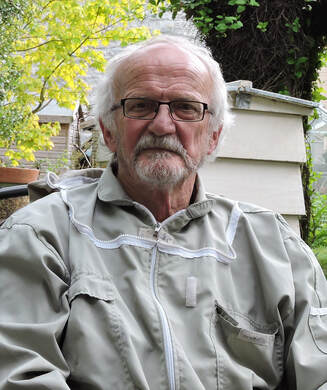 The Chairman of Somerset Beekeepers’ Association, Stewart Gould, is urging beekeepers to keep local honey bees and reject a campaign to overturn the recent ban on bee imports. “Locally bred bees are perfectly adapted for the conditions; imported bees carry the risk of pests and diseases and are genetically better suited to the country of origin,” he said. His comments follow media coverage of the new Brexit rules which have stopped the importation of honey bee colonies directly into the UK from the EU although queen bees are still allowed. HMRC is aware that there may be attempts to get around the import rules by using Northern Ireland as a back door but anti-avoidance measures are in place. “The importation ban is important and avoids the risk of bringing new problems to the UK’s bees. For example, bees in many areas of the country suffer from Chronic Bee Paralysis Virus which is associated with the importation of bees. And we are worried that the small hive beetle, which is in southern Italy, could come into the country and decimate our bees.” Somerset Beekeepers’ Association runs courses to help members to rear their own queen bees from successful colonies which ensures they are adapted to the conditions in their own area. Patrick Murfet from a beekeeping equipment company in Kent has started a petition calling on the government to reverse the new rules. The number of beekeepers continues to rise in the UK; membership of the British Beekeepers’ Association stands at more than 28,000 while Somerset’s is topping a record 1,200. Ends Beekeepers across the South West are calling on the public to join their first Asian Hornet Spring Watch campaign over Easter.
The highly destructive Asian hornets (Vespa velutina Nigrithorax) start to emerge from hibernation in the next few weeks before building up their numbers in the summer. Somerset’s Asian hornet action team coordinator Lynne Ingram said they hoped people from across the county would take part: “Lockdown means that people will be spending more time in their gardens and on walks around their neighbourhood this Easter. “We would like people to look for Asian hornets on flowers such as camellias, trees that ooze sap and in sheltered spots like sheds and porches while keeping within government guidelines in relation to Covid-19.” Asian hornets have distinctive orange faces and yellow tipped legs and are smaller than the bright yellow striped European hornet. “If anyone sees an insect they think is an Asian hornet, check it out on the Asian Hornet Watch app which has an identification guide and lets you send in your sightings.” Beekeepers and conservationists hope to mobilise support from all over the region to prevent the destructive insects getting established in the UK where they will decimate populations of pollinating insects and honeybees. “Given the many pressures on our precious pollinators, including climate change, habitat destruction and pesticide use, it’s vital we do all we can to support them by reporting sightings,” she added. Somerset Beekeepers’ Association has many useful ID materials on its website including a children’s colouring-in sheet. https://www.somersetbeekeepers.org.uk/resources.html Asian hornets are a notifiable invasive species and should be reported immediately, preferably with a photo using:
Ends Notes to editors: Asian hornets (Vespa velutina nigrithorax) are slightly smaller than native European hornets and look like large black wasps with an orange face and yellow legs:
A single Asian hornet can kill 50 bees a day, with a nest containing up to 6,000 workers and up to 350 queens. In Jersey, France and large areas of Western Europe they are stripping the environment bare of insects before moving on to prey on managed honeybee colonies. Asian hornets are a notifiable invasive species and should be reported immediately with photo using:
Beekeepers from across the South West are getting ready to tackle the imminent threat of deadly Asian hornets ahead of the coming season following a training day held in Somerset.
Organised by Somerset and Devon Beekeepers’ Associations on behalf of the South West Beekeepers’ Forum, 150 beekeepers have returned to their beekeeping associations armed with the latest techniques to combat the insects which could decimate honeybees and other pollinators. Somerset’s Asian hornet action team co-ordinator Lynne Ingram said: “We are on the Asian hornet front line here in the South West and this training day was a great opportunity to prepare ourselves for the season ahead. “Asian hornets don’t respect boundaries so it was important to start preparing to work together across the region. Although it was mainly beekeepers who attended the event, one of the key messages to get across is that Asian hornets are not just a problem for beekeepers. “We now know that these hornets build nests in garden hedges, bramble patches, in holes in the ground and also on buildings. We will be working hard to educate the public so that everyone can recognise a hornet and report a sighting. With thousands of people looking out for them, we have some chance of slowing the invasion.” The day-long programme included presentations about the latest research from Dr Peter Kennedy of the University of Exeter and Alastair Christie, Jersey’s Asian hornet coordinator, who shared his experience tracking the non-native hornets on the Channel Islands. SWBKF Chair Peter Darley commented: “I certainly learned a lot from some very good speakers and workshops and came away with a far clearer idea on how to proceed in our preparations to fend off the coming invasion…All of us can learn from Somerset's lead and, as a Forum, we are lucky to have them and their experience to show us the way.” Asian hornets (Vespa velutina nigrithorax) have distinctive orange faces, yellow tipped legs and are smaller than the bright yellow striped European hornet. They are a notifiable invasive species and sightings should be reported immediately:
Ends Photos were taken at the Asian hornet training event held at Bridgwater, Somerset. Notes to editors: Somerset Beekeepers’ Association (SBKA) is a Registered Charity run by volunteers and works to advance the craft of apiculture within its membership and to promote general awareness and understanding of honeybees. SBKA has given all its members monitoring traps and identification materials and the county is covered by 12 Asian hornet action teams which are trained to help with identification and to assist bee inspectors with verifying and tracking sightings. Asian hornets are active mainly between April and November (peak August to September) and are inactive over the winter.
Somerset Beekeepers’ Association and Exmoor National Park Authority are today (September 4) calling on the public to be on the lookout for yellow-legged Asian hornets which pose a serious threat to honeybees and other pollinators.
Beekeepers, supported by Exmoor National Park staff, have been investigating an as yet unconfirmed sighting of the highly invasive Vespa velutina nigrithorax in the Minehead area. Asian Hornet Week runs from September 9 to 15 throughout the UK and coincides with a good opportunity to prevent the destructive insects getting a foothold. Anne Pike, chairman of SBKA, said: “Vigilance is a cornerstone of our defence strategy and we want to mobilise the county to be on the lookout throughout September and October to protect the environment we treasure so much.” Somerset Beekeepers have set up 12 Asian hornet action teams, which cover the county, to follow-up reported sightings and educate the public. Ali Hawkins, Exmoor National Park Wildlife Conservation Officer, said: “There is a real risk to our own native honeybee and European hornet if these alien species are allowed to take hold. Given the many pressures on our precious pollinators, including climate change, habitat destruction and pesticide use, it’s vital we do all we can to support them by reporting sightings. A good quality photo gives the best chance of tracking down the nest to prevent further invasions and Autumn represents the most likely time to see them on the wing.” People in both rural and urban environments are urged to check plants which are in flower and attracting insects in the coming weeks, such as ivy. Anne Pike added: “The difficulty of protecting the UK from Asian hornets is underlined by Jersey’s experience. The first Asian hornet was spotted on the island in 2016 and, in spite of the efforts of local beekeepers and volunteers, this year they have caught 69 queens, discovered 54 nests and are still looking for more.” The Asian hornet has a distinctive orange face and yellow tipped legs and is smaller than the bright yellow striped European hornet. Asian hornets are a notifiable invasive species and should be reported immediately, preferably with a photo using:
ends Anne Pike, Chairman of Somerset Beekeepers’ Association, tel: 07971 275840; email: [email protected] Ailsa Stevens, Communications Officer, Exmoor National Park Authority, tel: 01398 322244, mob: 07772 092128, email: [email protected] Pic cap: An Asian hornet foraging on ivy in Brittany. Photo credit: Stewart Gould, Somerset Beekeepers’ Association Notes to editors: Somerset Beekeepers’ Association is a Registered Charity run by volunteers and works to advance the craft of apiculture within its membership and to promote general awareness and understanding of honeybees. Asian hornets (Vespa velutina nigrithorax) are slightly smaller than native European hornets and look like large black wasps with orange face and yellow legs:
A single Asian hornet can kill 50 bees a day, with a nest containing up to 6,000 workers and up to 350 queens. In Jersey, France and large areas of Western Europe they are stripping the environment bare of insects before moving on to prey on managed honeybee colonies. Asian hornets are a notifiable invasive species and should be reported immediately with photo using:
About Exmoor National Park Authority - www.exmoor-nationalpark.gov.uk First designated in 1954, Exmoor National Park has an amazing variety of landscapes within its 267 square miles – stunning coast, moorland, woodland, valleys and farmland and more than 800 miles of rights of way to enjoy. It is one of 15 National Parks in the United Kingdom and in 2011 was designated Europe’s first International Dark Sky Reserve. Exmoor National Park Authority works in partnership with the community, local councils, businesses and other organisations to look after the National Park and promote its conservation and enjoyment. Donations to CareMoor for Exmoor are gratefully received towards the upkeep of the National Park and its special qualities. Follow us on Facebook, Twitter, and Instagram. The County Honey Show held at Taunton Flower Show attracted a record number of entries and hosted the Asian hornet roadshow for the first time.
Beekeepers from as far afield as Cornwall competed in classes for the best honeys, wax and other products from or inspired by beekeeping. Somerset Beekeepers’ Association Chairman Anne Pike said it was a standout show: “Entries were the highest they’ve been for years and visitors to the Bees and Honey feature were treated with the sight of many hundreds of jars of honey, honeycombs straight from the hive and beautiful artwork. “It is wonderful to see more people get involved in these competitions which showcase the beauty of local honey and wax and their skills as beekeepers.” The Blue Ribbon for the best exhibit in the show went to John Roberts from Falmouth for a magnificent cake of beeswax. Local trophy winners included Jenny and Sid Gammon from Taunton; Maggie North, Buckland St Mary; David Pearce, Bathealton near Wiveliscombe; Mary Adams, Bishops Lydeard; Alan Nelson, Bilbrook; and Rob Fox, Minehead. Thousands of visitors to the two-day show held at Vivary Park pledged to look out for Asian hornets to protect honeybees and other pollinators. Beekeepers explained how to identify the hornets, which are sweeping across parts of Europe, including the Channel Islands, and causing the loss of many millions of bees and insects. Master Beekeeper Lynne Ingram, who leads the county’s Asian Hornet Action Team, said: “The greatest resource we have in fighting the Asian (yellow legged) hornet are members of the public. We hope the banners, leaflets and pinned specimens will help visitors to be aware of an insect which could wreak havoc on our environment if it gets a foothold in this country.” Results – Taunton Awards: The Taunton Perpetual Challenge Trophy: SJ & JA Gammon The Priscott Perpetual Skep: M. North The Stoker Perpetual Silver Trophy: SJ & JA Gammon The Pat Barter Silver Trophy: J. Roberts The W .Elmsall Perpetual Observation Hive Trophy: Taunton and District Beekeepers The Andy Coles Memorial Trophy for Mead: M. Adams The Tom Tucker Trophy for Cookery: R. Fox The Downes Perpetual Cup: R.Fox The Gammon Perpetual Trophy: B. Muckett The Taunton Honey Show plate: D. Pearce The Taunton Honey Show Perpetual Trophy: D. Pearce The Sally Bennett Trophy: M. North The John Spiller Mascot: D. Pearce County Cups: Jubilee Cup: J. Roberts Miss M.D Bindley Cup: A. Nelson Terry Arnold Perpetual Challenge Trophy: R. Fox The Duffin Challenge Trophy: J. Roberts The Clifford Langford Award for Mead: M. Adams The Blue Ribbon for the best exhibit in Show in the judges’ opinion: J. Roberts To find out more visit Somerset Beekeepers’ website: www.somersetbeekeepers.org.uk Ends Photo caps: John Roberts from Falmouth won the Blue Ribbon for the best exhibit in the show; Jenny Gammon from Taunton was awarded two trophies. For further information contact: Anne Pike, Chairman of Somerset Beekeepers’ Association, tel: 07971 275840; Lynne Ingram, Co-ordinator of Somerset’s Asian Hornet Action Team, tel: 07846 165877 Notes to editors: Somerset Beekeepers’ Association is a Registered Charity run by volunteers and works to advance the craft of apiculture within its membership and to promote general awareness and understanding of honeybees. The County Honey Show is open to all full members of SBKA and county associations in the UK. Asian hornets (Vespa velutina nigrithorax) are slightly smaller than native European hornets and look like large black wasps with orange face and yellow legs:
A single Asian hornet can kill 50 bees a day, with a nest containing up to 6,000 workers and up to 350 queens. In Jersey, France and large areas of Western Europe they are stripping the environment bare of insects before moving on to prey on managed honeybee colonies. Asian hornets are a notifiable invasive species and should be reported immediately with photo using: Asian Hornet Watch app [email protected] [email protected] Somerset Beekeepers’ Association is calling on visitors to the Royal Bath & West Show, which starts tomorrow (May 30) at Shepton Mallet, to be on the alert for a major threat to the UK’s pollinators.
For the first time they are running an interactive exhibit about the Asian hornet (Vespa velutina nigrithorax) in the Show’s popular Bees & Honey Feature. Association chairman Anne Pike said: “We want gardeners, farmers, walkers and all countryside-lovers, as well as beekeepers, to be on high alert for the imminent arrival of Asian hornets. “These hornets look like black wasps with yellow tipped legs and are as devastating to pollinators as foot and mouth disease was to livestock. “In France, where Asian hornets arrived in 2004, honey production is down by 50 per cent reflecting the impact these non-native and highly invasive insects are having on honeybee numbers.” Members of the newly-formed Asian Hornet Action Team will be on hand to talk to visitors about the hornet and explain how to correctly identify them. In addition to large information banners, there will be glass cases displaying Asian hornets next to European hornets and honeybees, identification leaflets to take away and children’s colouring-in sheets. Master Beekeeper Lynne Ingram, who heads up the Action Team, added “The greatest resource we have in fighting the Asian (yellow legged) hornet are members of the public. They are our eyes. Come into the tent and find out what an Asian hornet looks like. This time of year, look out for tiny embryo nests in sheds or garages. If you wait you will see the queen returning to feed her larvae. In June the workers will emerge and you may find them drinking nectar on flowers. If you see one, take a photo and report it on the Asian Hornet Watch app or contact [email protected] for further advice.” In addition, Somerset Beekeepers will be demonstrating the invaluable role honeybees play in the pollination of the nation’s best-loved food crops including apples and strawberries. Somerset members, together with beekeepers from Avon and Wiltshire, will be taking part in a highly competitive honey show, will run candle rolling for children, offer free honey tasting and advice about all aspects of beekeeping. In addition, visitors will have plenty of opportunities to see honeybees at work in observation hives, where bees are behind glass, and in the outdoor bee garden where beekeepers will demonstrate behind protective netting. To find out more visit Somerset Beekeepers’ website: https://www.somersetbeekeepers.org.uk/ Ends For further information contact: Anne Pike, Chairman of Somerset Beekeepers’ Association, tel: 07971 275840; Lynne Ingram, Co-ordinator of Somerset’s Asian Hornet Action Team, tel: 07846 165877 Notes to editors: Somerset Beekeepers’ Association is a Registered Charity run by volunteers and works to advance the craft of apiculture within its membership and to promote general awareness and understanding of honeybees. Asian hornets (Vespa velutina nigrithorax) are slightly smaller than native European hornets and look like large black wasps with orange face and yellow legs:
A single Asian hornet can kill 50 bees a day, with a nest containing up to 6,000 workers and up to 350 queens. In Jersey, France and large areas of Western Europe they are stripping the environment bare of insects before moving on to prey on managed honeybee colonies. Asian hornets are a notifiable invasive species and should be reported immediately with photo using: Asian Hornet Watch app [email protected] [email protected] |
Archives
September 2023
Categories
All
|
Somerset Beekeepers Association Charity © 2021 Registered CIO Charity 1206483
Affiliated to the British Beekeepers Association
Click here to view our Privacy Policy
Affiliated to the British Beekeepers Association
Click here to view our Privacy Policy
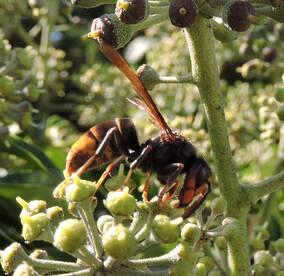
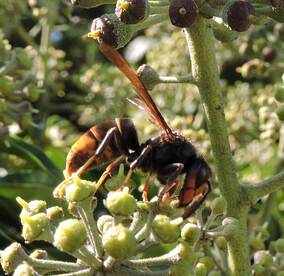
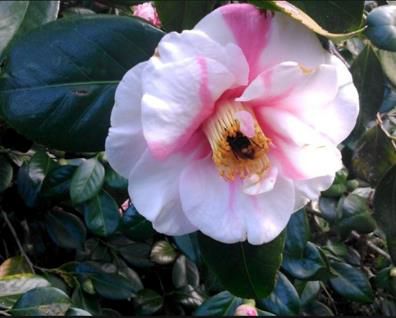
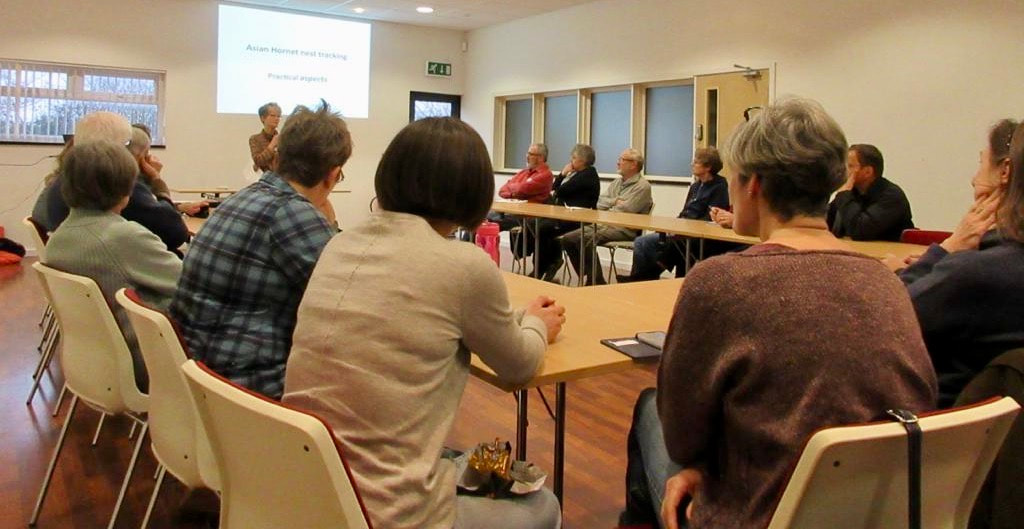
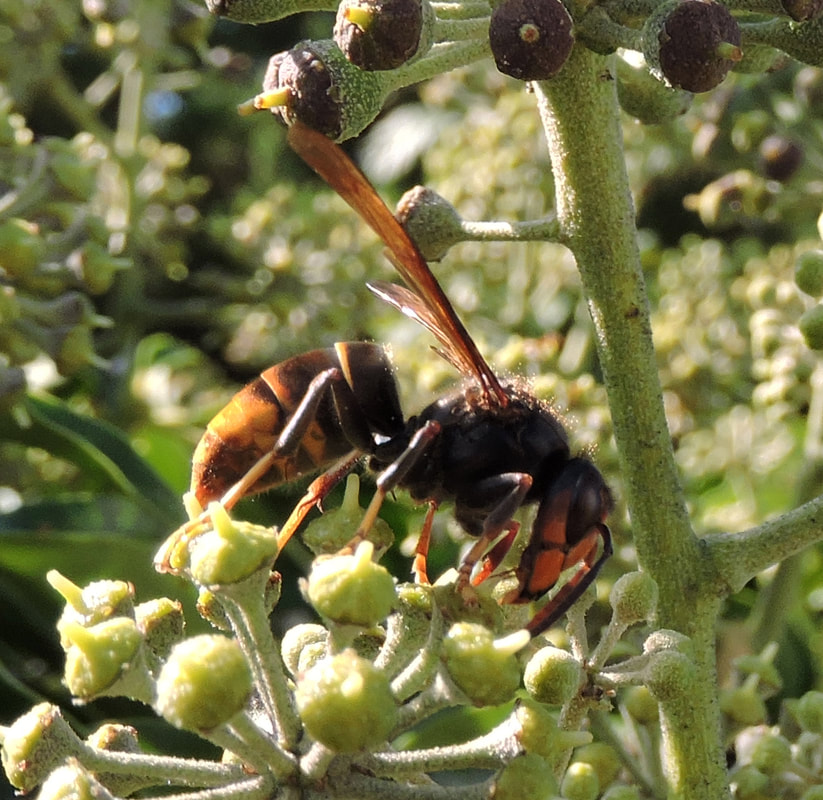
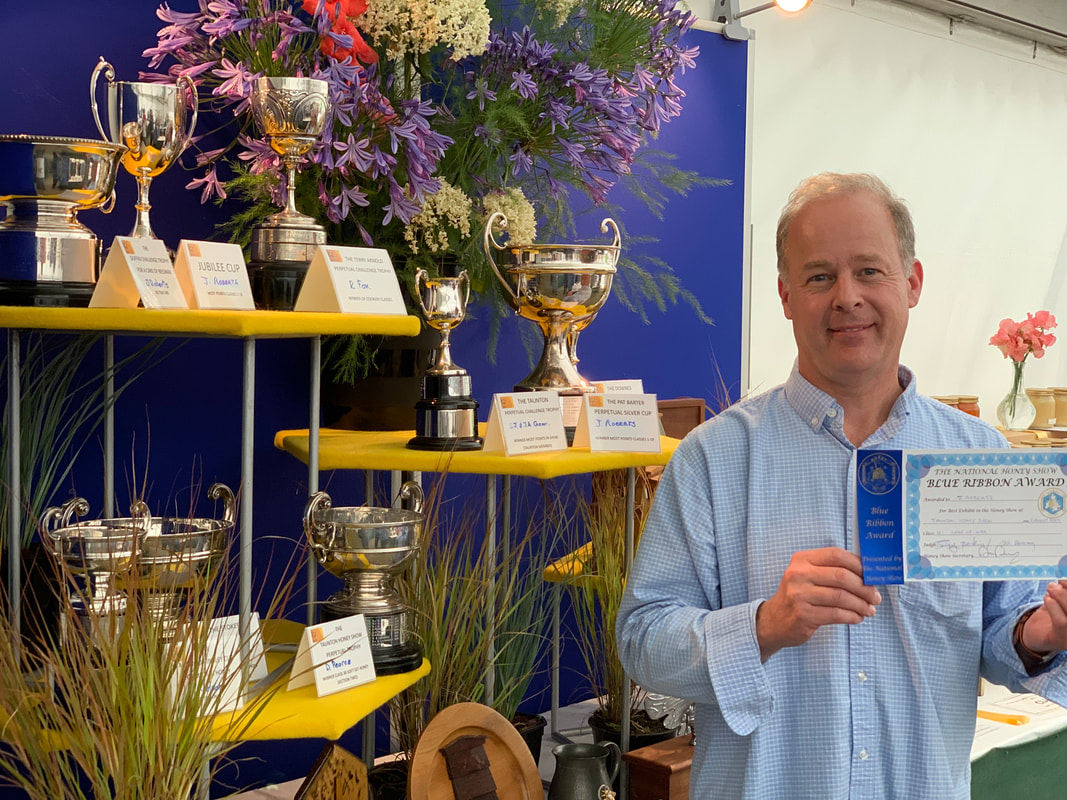
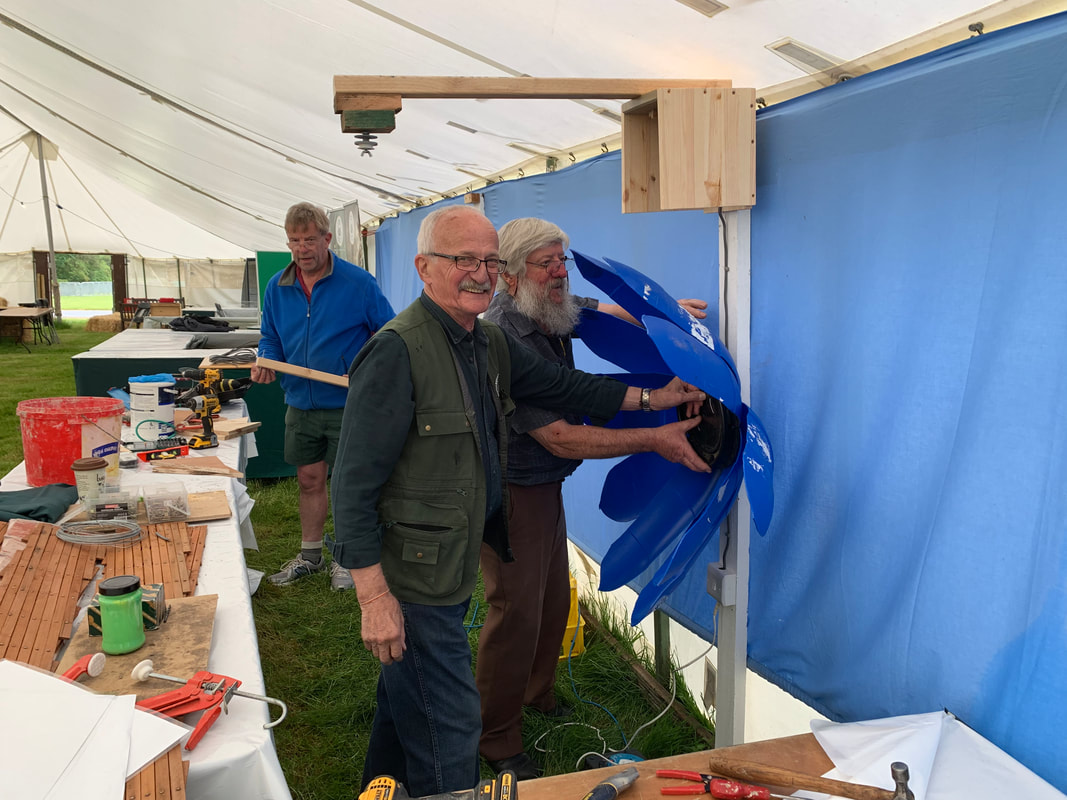
 RSS Feed
RSS Feed
